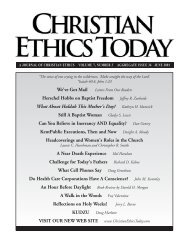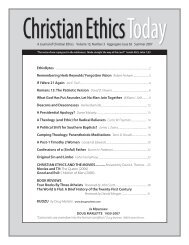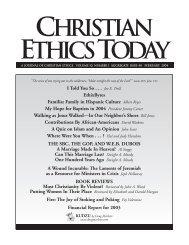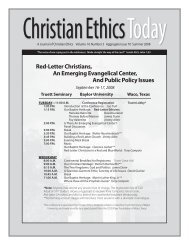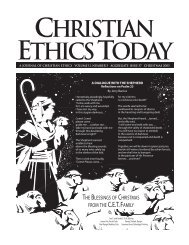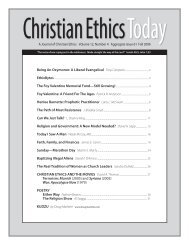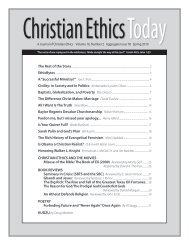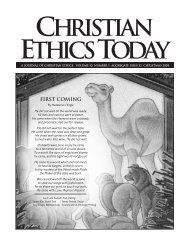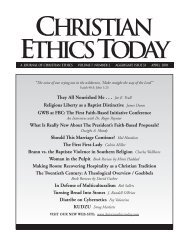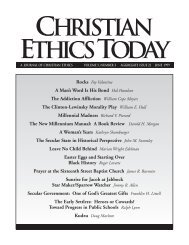Issue 032 PDF Version - Christian Ethics Today
Issue 032 PDF Version - Christian Ethics Today
Issue 032 PDF Version - Christian Ethics Today
You also want an ePaper? Increase the reach of your titles
YUMPU automatically turns print PDFs into web optimized ePapers that Google loves.
America in the White/Black racial dilemma (and this is the<br />
primary focus of the book) is obvious. But there is so much<br />
more to be done. Evangelical inconsistencies remain a major<br />
factor in this searing critique.<br />
The research the authors have done point succinctly to the<br />
white evangelicals who genuinely want this problem solved<br />
but do not want to pay the price necessary to bring progress to<br />
the table. They fail to recognize the depth of the problem.<br />
The authors firmly conclude that evangelicals could make<br />
a significant difference in America’s racial dilemma (which, of<br />
course, extend far beyond the white/black arena). They are<br />
also convinced that progress in federal and state legislation to<br />
some degree has been a solution. Nevertheless, American<br />
evangelicals must face the complexities of racism for “a racialized<br />
society is a society wherein race matters profoundly . . . it<br />
is a society that allocates differential economic, political,<br />
social, and even psychological rewards to groups along racial<br />
lines that are socially constructed” (p. 7).<br />
Many white evangelicals simply are unwilling to explore<br />
thoroughly these issues because of inherent individualism,<br />
believing that blacks could solve their problems if they really<br />
wanted to. Hence, the peculiar conclusion evangelicals face is<br />
a reluctant pessimism about the entire issue—this group will<br />
not face up to reality.<br />
Throughout the book there are some very interesting and<br />
appropriate references to the nineteenth-century observations<br />
of Alexis de Toqueville and the twentieth century’s classic<br />
study of race relations in America by Gunnar Myrdal. These<br />
European observers are strangely up-to-date in their widely<br />
publicized views, especially as it applies to contemporary<br />
evangelicals and their concepts of race in America. Both of<br />
these astute writers give balance and perspective to the charges<br />
that the evangelical movement not only minimizes the racial<br />
problem, but also blames the blacks for contributing to the<br />
problem by their unwillingness to forget the past.<br />
Perhaps the strongest lesson stemming from these pages is<br />
in the challenge that there is much work to be done “to reach<br />
the destination of equality, interdependence, and mutual<br />
understanding.” The authors compliment the evangelicals for<br />
their sincere desire to address racial issues; but the compliment<br />
is corrupted by the fact that most evangelicals (according<br />
to their research) are unwilling to make the sacrifices<br />
necessary to bring substantive progress. “Good intention fails<br />
to recognize the institutionalization of racialization in . . . the<br />
system” (p. 10).<br />
The book is a sharp wakeup call for all sincere <strong>Christian</strong>s<br />
who currently are not aware of the seriousness and complexity<br />
of America’s racial problems. It is not pleasant reading, but it<br />
is necessary reading for concerned followers of Christ, especially<br />
conservative, Bible-believing <strong>Christian</strong>s who have<br />
unique barriers to overcome. ■<br />
18 • FEBRUARY 2001 • CHRISTIAN ETHICS TODAY<br />
Core Values of a<br />
<strong>Christian</strong> Family<br />
By Paul Basden<br />
Pastor of Brookwood Baptist Church, Birmingham, Alabama<br />
Ahigh IQ is not needed to realize that families are the source<br />
of our greatest joys and our greatest sorrows. From the same<br />
people come the most satisfying and maddening experiences.<br />
Comedian Dennis Miller reminds us that it is our families who<br />
often stick with us through thick and thin. In Ranting Again, he<br />
writes: “Your family cuts you the most slack and gives you the<br />
most chances. When the quiz-show host says, ‘Name something<br />
you find in a refrigerator,’ and you say, ‘A dictionary,’ and the rest<br />
of America is screaming, ‘You moron!’ at their TV sets, who’s<br />
clapping and saying, ‘Good answer! Good answer!’ Your family,<br />
that’s who.” The old saying is true: “There’s nothing like a good<br />
family when you’re really up a tree.”<br />
Yet families can also drive us crazy. Perhaps you’ve heard the<br />
true story of the woman who was speaking with her college-aged<br />
nephew one evening. “During a phone conversation, my nephew<br />
mentioned that he was taking a psychology course at Butler<br />
University in Indianapolis. ‘Oh great,’ I said. ‘Now you’ll be analyzing<br />
everyone in the family.’ ‘No, no,’ he replied. ‘I don’t take<br />
abnormal psychology until next quarter.’”<br />
Maybe Robert Frost was closest to the truth when he wrote,<br />
“Home is the place where, When you have to go there, They have<br />
to take you in.” Clearly we have a love-hate relationship with our<br />
family. Most of us would prefer that it be a little more love-love.<br />
Is such a thing possible? Can our families be more like God<br />
intended them to be?<br />
Two years ago a church member gave me former Georgia<br />
Governor Zell Miller’s book entitled Corps Values. I read it with<br />
interest and profit. Miller maintains that the Marine Corps<br />
instills a handful of crucial values in its recruits, values such as<br />
neatness, punctuality, persistence, respect, courage and loyalty.<br />
Believing that American society is cracking and crumbling at its<br />
very foundations, and convinced that the United States would be<br />
a better place if everyone adopted the twelve Marine Corps<br />
ideals, he proposes them as the core values for our country.<br />
That got me thinking: many <strong>Christian</strong> families are not only<br />
noticing that our national society is in this sad shape; they are<br />
noticing that their very own families are beginning to crack and<br />
crumble as well. We are facing difficult challenges that are adding<br />
heavy stresses to today’s families. Are there core values that we as<br />
<strong>Christian</strong>s can adopt for our families?<br />
The answer is a resounding yes! <strong>Christian</strong> families are not<br />
clueless about God’s will for domestic life. God has shown us his<br />
intentions for the home. He has revealed in Holy Scripture several<br />
core values, which can guide us as we seek to build godly families.<br />
The sixth chapter of Deuteronomy points to three of those



